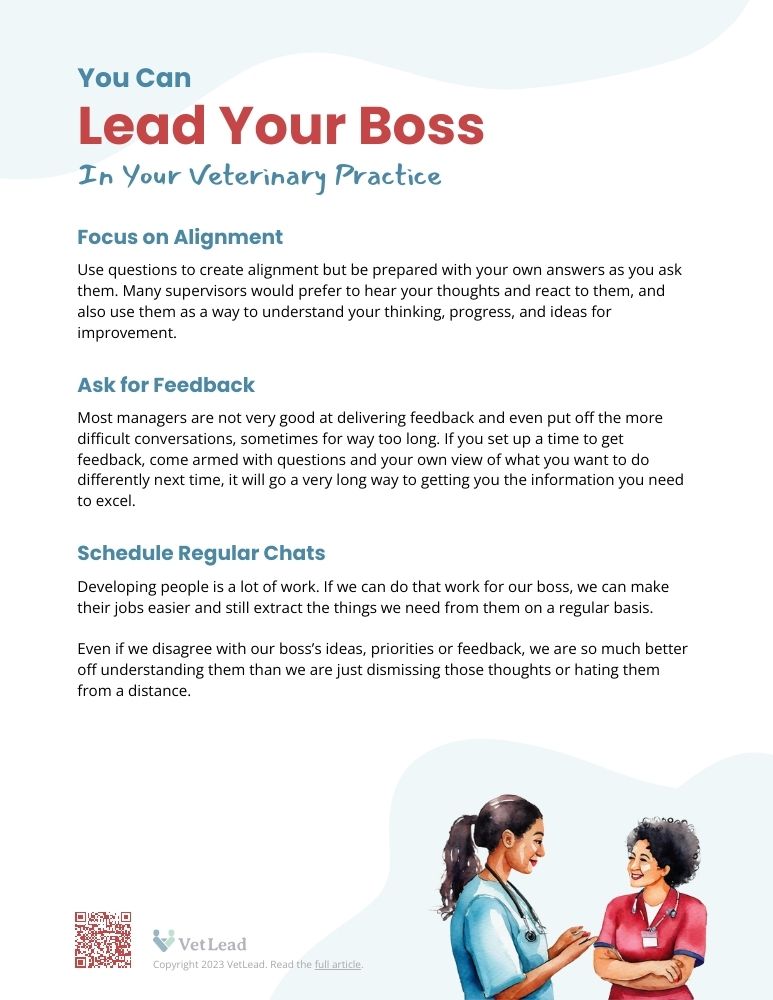Something I hear a lot when working with veterinary practices is, “I wish my boss were here to learn this.” It’s hard not to be focusing on becoming a better leader and sometimes wish there were better leaders around you. Or even more importantly, that you had one of those better leaders as a boss.
It serves to highlight the fact that most bosses are not great leaders. It also serves to illuminate for us the importance of developing into a great leader so that the people on our team don’t find themselves wishing we were better leaders for them.
“I wish my boss was a better leader.”
But even as we confront those possibilities in our veterinary practice, the reality still lingers that most of us believe we could be more successful if our boss was a better leader. That’s probably true and it’s why leadership development is so important. It is the key to improving entire teams and hospitals.
It’s also the only lasting, sustainable guarantee we can put in place for a better future. If we have great leaders, we will adapt to all changes and still build our best future even as the circumstances around us take a different shape.
And so, if we do find ourselves in that space where we wish our supervisor was better, what do we do? How do we operate so that we can still lead others well, enjoy our work and secure our own future despite not having the person above us who supports all of that, challenges us to reach new levels, or even thinks about our goals or our best interests?
You Can Lead Up in Your Veterinary Practice
Well one of the most interesting characteristics of leadership is that it doesn’t just work on people who report to us or are downstream in our practice. We can lead up just as effectively. We might need to adjust our thinking a bit, but we can use the same processes and habits that we use to lead members of our team, to lead our boss.

Remember, if we are thinking about leadership as causing others to think differently, make choices and build habits that help them become more successful, then we can do it for anyone regardless of their authority, role, or level.
Three Things You Can Do to Lead Your Supervisor
Here are three things that you can do to lead your boss more effectively, in ways that can help you achieve even more success.
1
Focus on Alignment
Most of the challenges we think we have with supervisors come from having two different sets of priorities or expectations. At the beginning of something new, you can create alignment through questions:
- How would you define success for this project?
- What do you see as our most important areas of focus this week?
- What would you change about how I tackle this based on similar things I have done in the past?
- What do you think I need to be focused on as I begin this work?
Use questions like this to create alignment but be prepared with your own answers as you ask these. Many leaders would prefer to hear your thoughts and react to them, and also use them as a way to understand your thinking, progress, and ideas for improvement.
Become a Strategic Thinker
You also create alignment, and position yourself as a strategic thinker, by laying out plans, changes and ideas. Write them down and set up time to discuss them:
- “Here is how I am planning to approach this new process.”
- “Here are my thoughts, the challenges I expect and the results I am committed to achieving.”
Imagine how much better you would be able to get ahead of alignment challenges if those on your team did that for you.
2
Ask for Feedback
Most supervisors are not very good at delivering feedback and even put off the more difficult conversations, sometimes for way too long. If you set up a time to get feedback, come armed with questions and your own view of what you want to do differently next time, it will go a very long way to getting you the information you need to excel.

It also prepares you for feedback mentally, which causes us to react differently than if we are just pulled aside and criticized or have to deal with a lecture that points out our mistakes.
We handle feedback much more constructively when we prepare to receive it and have already done our own analysis of our performance as it compares to our very best.
3
Schedule Regular Chats
(and make them valuable for your boss)
Developing people is a lot of work. It’s well worth it, but it takes a lot of effort, planning, time and thought to do it well. If we can do that work for our boss, we can make their jobs easier and still extract the things we need from them on a regular basis.
Even if we disagree with our boss’s ideas, priorities or feedback, we are so much better off understanding them than we are just dismissing those thoughts or hating them from a distance.
Our job is to understand that we will often get better by hearing from someone who has a different level of experience and a different point of view about our success, and an outside perspective on our success in our veterinary work. Even if we think they are wrong about everything, we still get to use them to challenge our thoughts and make that choice.
Final Thoughts
Surviving a difficult boss in your veterinary hospital is something that most of us encounter in our career at some point. Our opportunity is to learn to adapt and put strategies in place that help us continue to succeed in the face of that challenge.
As a leader we need constant practice on how we think, how we choose our actions, and the habits we build to keep us on track. Even bad bosses can help us with those if we just do a little of their work for them.
The results may just be that we get what we need to achieve our best future.

Download this accompanying PDF now
Share it with leaders and teams. No email address required.
Have you led your boss? Share your story in the comments below.
